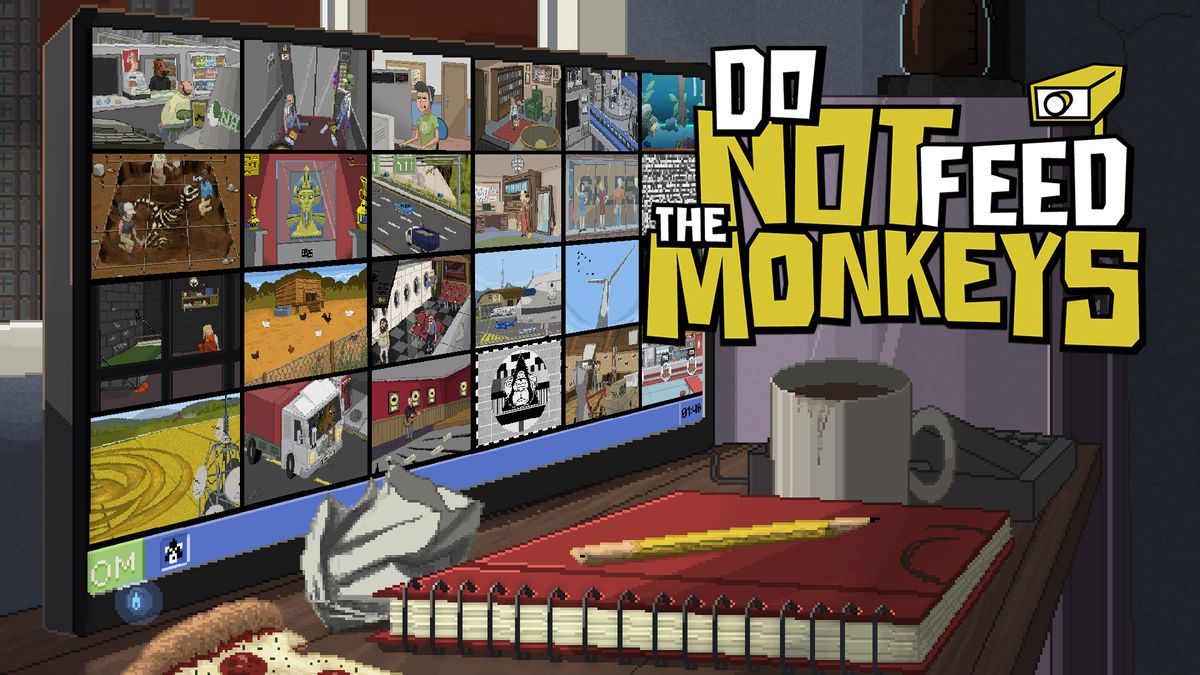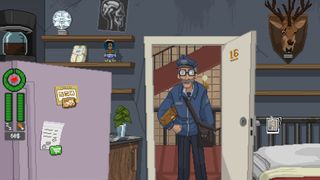
In the current climate of paranoia around how our personal data is harvested, and an ever expanding trend of capturing every moment on video or sharing every nuance of our personal lives online, a game like Do Not Feed the Monkeys feels particularly well-timed.
Do Not Feed the Monkeys drops players into a scenario familiar to anyone who’s seen the 1993 film Sliver or, more recently, the CBS drama Person of Interest. Through a fleet of surveillance cameras and hijacked webcams, you look in on the lives of strangers and voyeuristically observe some of their most intimate and revealing moments. Recruited by a mysterious friend to join the Primate Observation Club, a shadowy secret society of murky provenance, the player must constantly expand their suite of ‘cages,’ the picture-in-picture boxes on your in-game PC that serve as the windows into the lives of strangers.

Of course, the cages aren’t free, and if you fall behind on a schedule of constant expansion you’ll be expelled from the Club and lose your voyeuristic privileges. This means you’ll need to break away from the hypnotic bank of private experiences to earn enough cash to both keep up with your cage quota and to feed your inconvenient human husk (in the game, mind you, though the parallels to gaming in real life are pretty clear). You make money by doing odd jobs posted to the door of your dingy apartment, and a big part of the gameplay loop is balancing those time consuming jobs with sleep and continually expanding (and scraping data from) your surveillance activities. Needing to manage your hunger and energy meters and balancing spending money on basic necessities vs. expanding your collection of cages creates a sort of survival-lite element pleasantly layered on top of the game’s layered, choice-driven narrative.

The name of the game refers to the Club’s first and most important rule: members are never to interact with or interfere in the lives of the subjects of their observation. This is reinforced both through the introductory email the Club gets you before the surveillance software is installed as well through conversation with the friend that initially recruited you, though you quickly realize that the game doth protest too much, and in fact much of the fun comes from those forbidden interactions. You can have items delivered to your subjects, electronically manipulate their environments, or even chat with them directly.

A lot of these interactions are humorous and many of the characters decidedly zany, but some of them definitely have an underlying darkness, and that balance is one of the game’s greatest strengths. The lighthearted nature of many of the interactions and the playful pixel art and UI contrast sharply with an almost oppressive tone suggesting a dystopia where secret societies are always watching and recording and pulling the strings of our lives without our knowledge or consent. It’s a bizarre and delightful intersection of the brutalist oppression of Papers Please and the fantastical whimsy of Undertale, a difficult cocktail to mix but one served here with style and aplomb.

Do Not Feed the Monkeys has already racked up a number of awards for its unique approach to storytelling and gameplay, including the Media Choice Award at Indicade Europe in Paris, and was selected as the Best Indie Game at the Strasbourg European Fantastic Film Festival. It releases on Steam on October 23rd, 8:00pm PDT, just in time for Halloween, which feels oddly appropriate given some of the themes of insidious secret societies and ubiquitous surveillance.
Sign up to the 12DOVE Newsletter
Weekly digests, tales from the communities you love, and more
